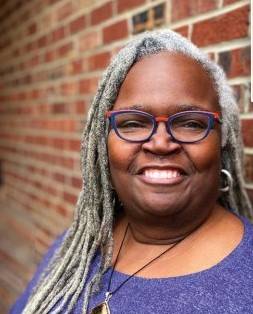I started my journey in PSR’s Master of Theological Studies (MTS) program searching for a decolonized Jesus, the one who existed before being coopted by colonial missionaries. I must admit I didn’t really know exactly what I was looking for, but I’d seen enough pictures of brown-skinned people around the world declaring allegiance to a white-bodied Jesus that I wanted to know if there was a hint, anywhere in theology or history, of the Jesus who affirmed the inherent blessedness of those of us in dark skin.
In 1493 the Pope declared that European colonization was an act of God’s will. Fueled by what they understood to be the authority of Christ, Eurocentric interests, and anti-indigenous sentiment, missionaries joined colonial authorities in a project to create the Eurocentric version of Christ’s Kingdom all over the world. This Eurocentric, Christian Kingdom reinforced destructive ideas about non-European bodies rooted in theology that declared dark-skinned bodies unholy and even deserving of domination and destruction. Under that logic, the only way to be saved, or welcomed into the Kingdom of God, was to approximate whiteness. Salvation was a conduit to and a by-product of colonization.
One glaring example of Salvation through colonization was the work of Puritan missionary John Eliot. Eliot is widely understood to be the father of the American missionary movement. His primary tool of conversion, the “Praying Town” required Native Americans who wanted to be considered “Praying Indians” to leave their existing family groupings and communities to be indoctrinated into English ways of dressing, farming, and even home building. Praying Towns represented a toxic combination of missional impulse mixed with belief in European superiority. Eliot used the full force of English social and economic life to build what effectively became a form of imprisonment. Salvation was understood to only come to Native Americans by way of acceding to the English way of life.
I’d honestly question my own word choice here. “Acceding” implies some kind of reasonable path to a point of acceptance. What happened to Indigenous Americans “in the name of Jesus” was something closer to Dorothy’s flying house in The Wizard of Oz landing on, and destroying, the Wicked Witch of the East. The material difference is that what was crushed underneath the “House of Colonization” were the very real ways Indigenous cultures related to the Earth, the Divine, and each other. This Colonial crushing isn’t limited to the United States. Colonial endeavors have impacted indigenous cultures around the world.
I entered my studies hoping to find the unadulterated Jesus at the center of a Venn diagram of these colonized cultures. Instead, I found indigenous theologians engaged in the sacred work of recovering or retrieving what was obscured by Western Christendom. Instead of Salvation through colonization, the recovery of the ancient wisdom of indigenous cultures might be the salvation needed for our age. In a time of global panic about devastation precipitated by the climate crisis, the uniquely American panic about rampant gun violence, and a host of other social issues, I think that the co-creative union found in indigenous societies between humanity, nature, and the Divine is our path to healing.
Following this healing path as someone formed in Western Christendom requires me to take seriously the need to disrupt the systems and power structures rooted in theology that declares only certain ways of being as blessed by God. This is hard, vigilant work, both for my own life and for the faith community I lead. This kind of disruption is more than an intellectual exercise. Disrupting the ubiquity of Western individualism and the destructive hierarchies arising from it cannot be done outside of embodied, communal learning. I have had the privilege of putting some of my PSR studies into action by creating an experimental workshop focused on rediscovering the ancient wisdom obscured by the “House of Colonization.” Together, participants accompany each other on a journey to move from destructive and exploitative ways of living in the world to deepening life in communion with each other, the Divine, and all of Creation.
Salvation in the hands of the colonizer became a tool of erasure and destruction perpetuated through centuries of dominance. I believe that what humanity and the earth need right now is a salvation that has been hiding in plain sight. As it says in the book of Jeremiah, we have only to “Stand at the crossroads and look; ask for the ancient paths, ask where the good way is, and walk in it….” (Jeremiah 6:16).
 Leeann Younger is a recent graduate of PSR (MTS ’23) and entered PSR’s Doctor of Ministry program in Fall ’23. She is the Pastor of Cityview Covenant Church in Pittsburgh, PA, a congregation she planted with her husband, Wayne, in 2010. In addition to leading the congregation, she currently chairs the Pittsburgh Democratic Committee, and can also be found working with other neighborhood leaders to create change that supports vulnerable community members. Leeann‘s blogs about the intersection of faith, race, and justice can be found at MissionAlliance.org and leeannshawyounger.com. Leeann and Wayne have three children: Shaw, Isaiah, and Kayla.
Leeann Younger is a recent graduate of PSR (MTS ’23) and entered PSR’s Doctor of Ministry program in Fall ’23. She is the Pastor of Cityview Covenant Church in Pittsburgh, PA, a congregation she planted with her husband, Wayne, in 2010. In addition to leading the congregation, she currently chairs the Pittsburgh Democratic Committee, and can also be found working with other neighborhood leaders to create change that supports vulnerable community members. Leeann‘s blogs about the intersection of faith, race, and justice can be found at MissionAlliance.org and leeannshawyounger.com. Leeann and Wayne have three children: Shaw, Isaiah, and Kayla.
